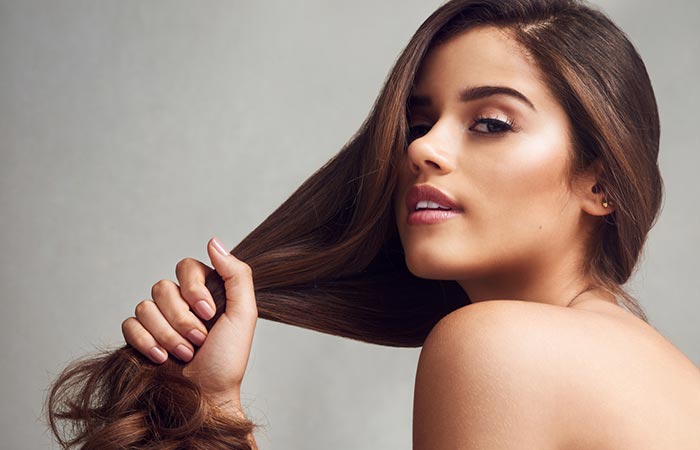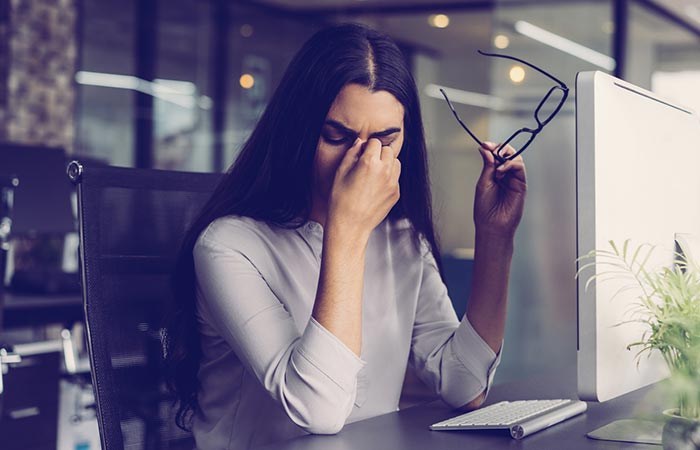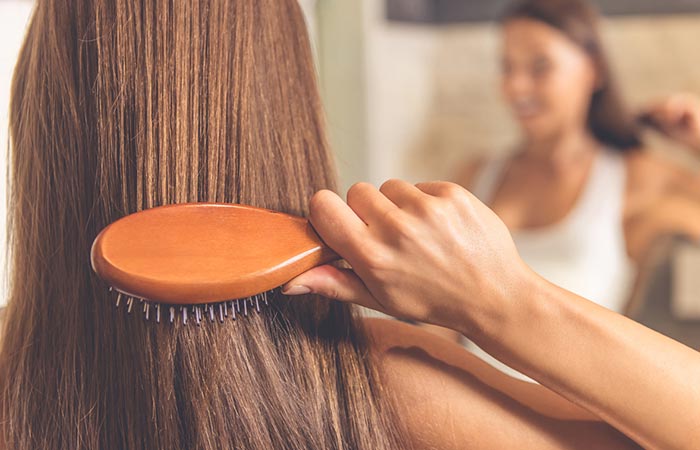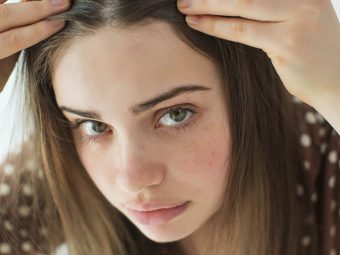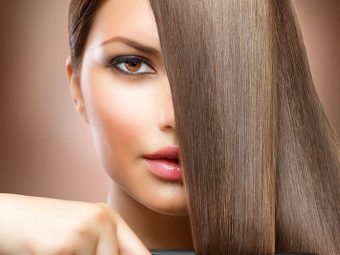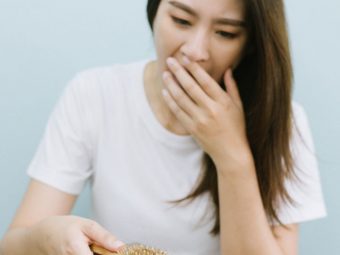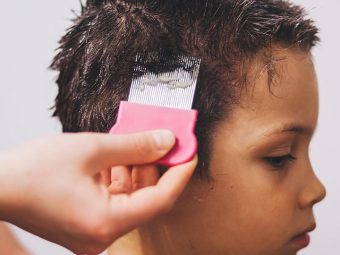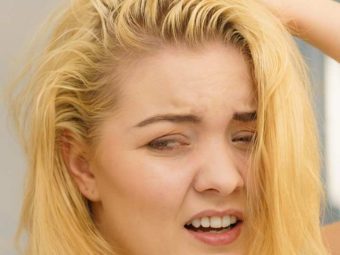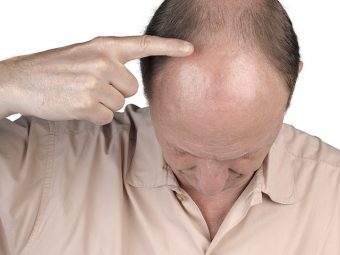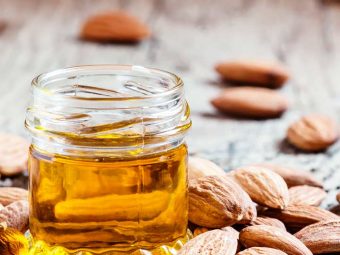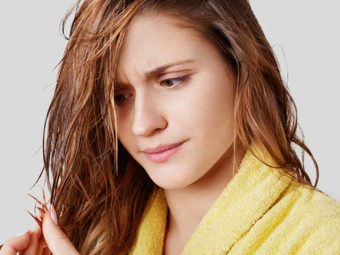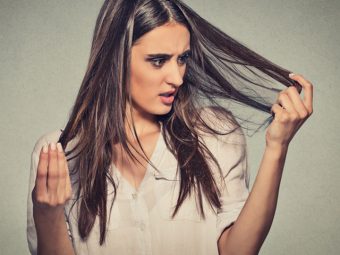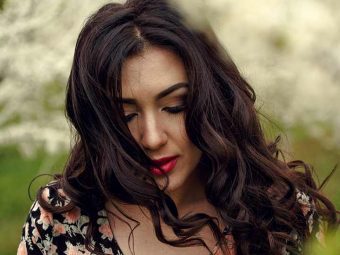13 Reasons Why Your Hair Stops Growing
Understanding the reasons and causes is the first step to ensuring proper hair care and growth.
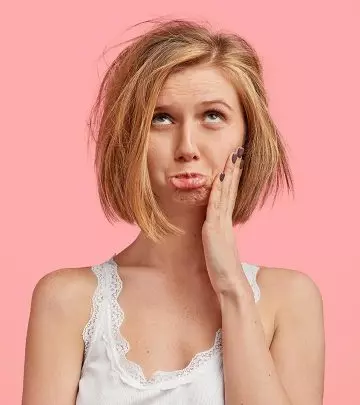
Image: Shutterstock
Wondering why your hair stopped growing? You notice that your hair has started to thin, and you have lost volume. Although this happens with age, it could also point to a serious underlying medical condition. It is important to understand the different causes of hair loss to ensure timely treatment. Poor lifestyle choices, pollution, stress, and an imbalanced diet are the major reasons your hair stops growing. Read this post to understand the changes you need to make to get healthy tresses.
In This Article
How Much Does Hair Grow In A Year?
Every person’s hair is genetically programmed to stop growing after reaching a particular length, after which it goes through the catagen, telogen, and exogen phases before growing again (1).
An average person’s hair grows at a rate of 6 inches per year, and usually, the anagen phase (growth phase) lasts between 2-6 years. However, different people have different hair growth cycles that are affected by many factors that we will discuss next.
A study that appeared in Animals documented the rate of hair growth (measured in centimeters) in horses for each month. While it was an equine study, it offers an intriguing perspective on how seasons can affect the rate of hair growth. As the graph indicates, horses’ hair grows the fastest in winter and the slowest in summer.
Hair Growth Rates Over A Year
Source: Temporary Relocation during Rest Periods: Relocation Stress and Other Factors Influence Hair Cortisol Concentrations in HorsesWhy Won’t My Hair Grow?
Your hair follicles go through a growth cycle that has four phases: 1. Anagen phase (growing phase) 2. Catagen phase (transition phase) 3. Telogen phase (resting phase) and 4. Exogen phase (hair shedding phase).
Each hair follicle goes through this cycle, which determines the length and volume of a person’s tresses. If this cycle is disrupted due to any factor, normal hair growth is affected. Following are the most common reasons your hair stops growing:
1. Genetics
Did you know that the length, color, volume, and strength of your locks is governed by your genes? Yes, genes play a significant role in influencing your hair growth cycle (2).
If you have long, healthy, lustrous, and thick hair despite not taking much care of it, thank your genes. Otherwise, you need to put in extra effort to stop your hair from thinning and enhance its growth.
2. Stress Level
It is medically proven that any kind of physical or psychological stress is detrimental to hair growth (3). Stress triggers a condition called Telogen effluviumi XA reversible condition where hair falls out after a stressful experience and is a common cause of diffuse non-scarring alopecia. in which your hair enters the telogen phase (resting phase) prematurely, thus restricting 30% of its growth completely (4). Though this condition does not require any medical treatment and lasts no longer than six months, it does affect your hair growth cycle and cause hair loss. Elongation stoppage or growth cessation can be due to stress or environmental factors.
 Quick Tip
Quick Tip3. Age
Aging not only causes your hair to gray but also affects its growth because the anagen phase is known to get shorter as you grow older, leading to follicle dormancy (5). Also, your physical health and food habits – besides the lifetime of experiments with styling, processing, dyeing, bleaching, and treating your hair – affect your hair growth cycle (6). In other words, hair maturity can affect the hair growth cycle. As we age, the hair follicles become less active leading to follicle decline and scalp deterioration.
4. Hair Breakage
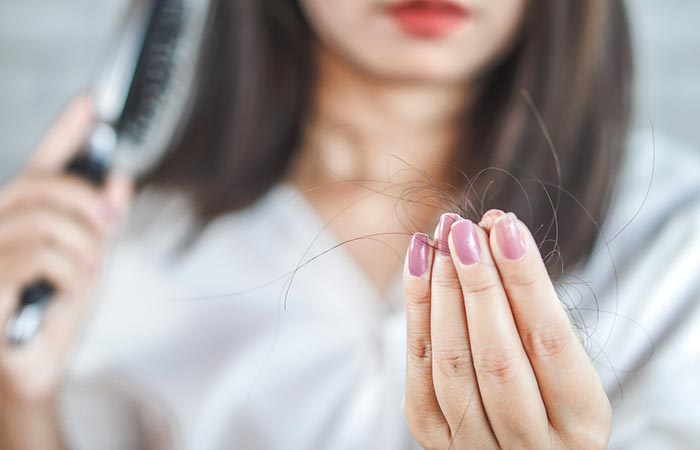
Normally, an average person’s hair grows at a rate of about 6 inches per year. If you observe that your hair is the same length even after a certain period, it might actually be breaking (2). This is also known as a growth plateau and is very common.
Hair breakage can be caused by both inadequate or excessive care. Overprocessing and heat styling your hair excessively may result in the loss of moisture and elasticity, causing it to become dry and brittle and leading to breakage.
5. Split Ends
People with dry hair usually get split ends. If your hair does not receive enough nutrients to balance the moisture levels, its ends will start splitting, resulting in breakage. You cannot undo split ends, and the only way to stop them from causing further hair breakage is to cut them off. You must take adequate care of your hair to avoid split ends and breakage.
6. Hairstyles And Styling Products
The chemical treatments, products, and processes used to style your hair have a big impact on its health and growth (2). The build-up of oils and products on your scalp can block the follicles and impede hair growth or cause development disruption.
Complicated hairstyles that involve a lot of combing, pulling your hair tight, and the use of serums can also lead to hair damage. Excessive styling and the use of chemical products will not only stop your hair growth but also cause scalp diseases that can lead to permanent hair loss or follicle damage. Also, Scalp condition changes such as dandruff or other infections such as psoriasis can lead to growth impediment.
Bee, a blogger, shared how frequently changing her hairstyles inhibited her hair growth. She said, “When you keep playing with your hair and switching styles every two days for variety, your poor strands just suffer and break (i)”
 Quick Tip
Quick Tip7. Alopecia Areata
Alopecia areata is an autoimmune disorder in which the immune system harms the cells in your hair follicles and causes your hair to fall out in patches (7). It can also lead to growth termination and follicle death.
Scientists believe that this condition might be genetically inherited, and people diagnosed with hay feveri XAn allergic reaction to pollen, pet hair, or dust, which causes sneezing, watery eyes, and a runny nose. , vitiligoi XA chronic auto-immune condition that results in your skin developing pale white patches on the skin due to genetic changes or stress. , Down syndromei X A genetic disorder in which a person has an extra chromosome that can lead to minor to severe physical & developmental issues. , pernicious anemiai XA decrease in red blood cells that takes place when the intestines cannot absorb enough vitamin B12. , asthmai XThe swelling and narrowing of airways that cause symptoms like shortness of breath, wheezing, and coughing. , and thyroid issues have a higher risk of developing it. However, proper medication and phototherapyi XA type of treatment that uses a specific type of UV or laser light to boost hair growth in people experiencing pattern hair loss. can treat this condition.
8. Lack Of Exercise And Healthy Diet
We are sure you have heard of the phrase, “You are what you eat.” A healthy diet and exercise routine are very important for hair growth. Just like your body, your hair also requires adequate vitamins, minerals, and nutrients to grow (8).
In fact, doctors suggest people take certain multivitamins in addition to a healthy diet to boost hair growth. Deficiencies of iron, protein, zinc, vitamin A, or biotin can weaken your hair, subjecting it to damage and loss.
However, if you take adequate intake of vitamins, minerals, and nutrients to nourish your hair follicles and strengthen your tresses, you can prevent hair loss and promote healthy hair growth. Also, keeping your mind as healthy as your body does great wonders for your hair.
9. Dry Hair And Scalp
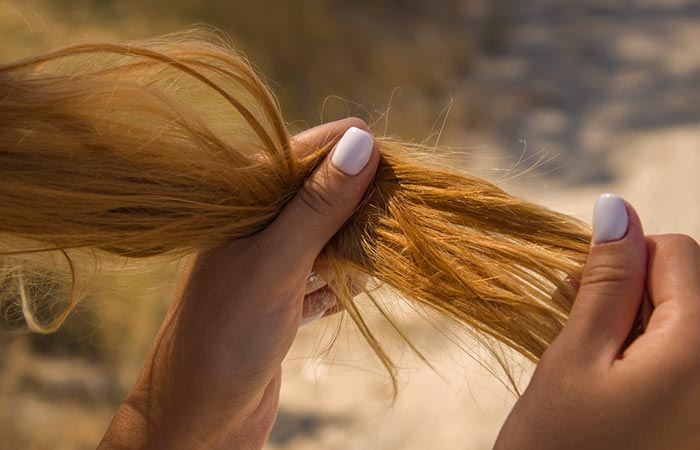
Dry scalp and brittle tresses are signs of unhealthy hair. Scalp changes such as lack of moisture or imbalance in the moisture levels can make your hair dry, leading to breakage and restricting its growth.
Prolonged dryness of your scalp also leads to the development of infections that cause patchy hair loss. Therefore, you need to moisturize your hair with natural products and methods to promote healthy hair growth.
10. Thyroid Problems
Irregularities in the production of hormones by the thyroid gland can also have a negative impact on your hair (9). Both hypothyroidism and hyperthyroidismi XOverproduction of a hormone by the thyroid glands that speeds up the metabolism and causes weight loss or irritability. can affect hair growth as they affect your body’s functionality and metabolism, thereby causing hair thinning and hair fall.
11. Childbirth And Breastfeeding
Hormonal imbalances after childbirth often result in what is known as postpartum hair loss (10). A healthy diet, regular exercise, and intake of additional nutritional supplements are necessary to minimize postpartum hair loss.
12. Poor Hair Care Regimen
An improper hair care regimen can have a major negative impact on your hair growth (2). Excessive styling, inadequate washing and conditioning, use of chemical products, inefficient hair care tools, and hair damaging accessories indicate a substandard hair care routine, which needs to be changed as soon as possible if you want thick, long, and healthy hair.
13. Hormonal Imbalance
Hormonal imbalances can affect both men and women, causing hair thinning or loss. Hormones such as DHEAS (dehydroepiandrosterone sulfate) and testosterone have a significant impact on your hair growth. Excess levels of these hormones may cause excessive body or facial hair growth. Conversely, severely low levels may cause hair loss or thinning hair (11). Apart from this, the low estrogen and progesterone levels experienced during menopause, postpartum, and perimenopause may result in decreased hair density and excessive shedding. Further, the release of the hormone, cortisol during stress may affect follicular growth and slow down hair growth (11).
What Can Be Done If Your Hair Is Not Growing?
When you realize your hair is not growing anymore, it’s time to take proper care of it to minimize hair loss and damage. Once you figure out the reason for your reduced hair growth, you can try out various ways to prevent excess hair fall.
A proper hair care routine, adequate diet, and regular exercises to keep your body and mind healthy, following the prescribed medication for the treatment of complicated health issues, avoiding over styling your hair, and replacing chemical products with natural and environment-friendly ones are some ways to maintain healthy hair and protect it from further damage and loss.
Infographic: Know Why Your Hair Has Stopped Growing
You realize your hair growth has probably stopped when your hair seems to have lost its volume, looks thin, and does not grow long even after a prolonged time. You are probably wondering, “Why is my hair not growing?” Several factors affect hair growth. Hence, finding the underlying reason and making the necessary changes is essential.
Check out the common reasons hair stops growing and how you can treat and prevent this condition. Illustration: StyleCraze Design Team
On average, your hair grows 6 inches every year. Due to disruption of the hair growth cycle, your hair may stop growing. Multiple factors such as genetics, stress, age, poor diet, or aggressive hair styling can lead to hair loss. It may also be a sign of an underlying medical condition. A balanced diet, physical exercise, and a proper hair care routine can protect your hair from further damage. However, if you continue experiencing severe hair fall, consult your doctor for proper diagnosis and further treatment.
Frequently Asked Questions
At what age does the hair stop growing?
Hair growth is a fascinating and dynamic process, influenced by a natural cycle of growth, rest, and shedding phases. The length of the growth phase, known as anagen, can vary greatly between individuals and can last anywhere from 2 to 6 years. While age may impact the speed of this cycle, it does not necessarily signal the end of hair growth. So embrace your hair journey and enjoy the unique beauty and diversity of this natural process!
Does metabolism affect hair growth?
Yes. A healthy metabolism holds the key to stunning hair! Research has uncovered a surprising connection between your metabolism and hair health, showing that a healthy metabolism can lead to stronger, longer, and more vibrant hair (12). So, embrace the power of a healthy metabolism and nourish your hair from the inside out through a balanced diet and regular exercise. Your hair will thank you!
How do I restart my hair growth cycle?
Focus on a healthy, balanced diet that includes plenty of vitamins, iron, fiber, and protein. Even add some nutritional supplements to help take things up a notch. Consider foods that are especially rich in biotin and protein to help your hair grow back stronger and faster.
How often should I trim my hair to promote growth?
To promote healthy hair growth, it’s best to trim your hair on a regular basis. How often you do this depends on your hair’s length, texture, and condition. For maintaining hair length, you should aim for a trim every 8 to 10 weeks. However, if you’re trying to grow longer hair, you can reduce this frequency to every 12 to 16 weeks.
Does frequent washing of hair affect hair growth?
Yes, washing your hair frequently can lead to hair loss, since it makes your strands brittle and vulnerable to breakage. Overwashing also strips your hair of its natural oils, which could cause damage and dryness. Typically, you should aim to wash your hair every 2-3 days, depending on your hair type and lifestyle.
Key Takeaways
- Hair follicles go through a growth cycle that determines their length and volume.
- Several internal or external factors may disrupt this cycle and hinder normal hair growth.
- Stress, genetics, thyroid, and lack of proper diet and exercise are the most common factors that affect hair growth.
- Some external factors that may hinder hair growth include poor hair care practices, heat styling, and excessive use of harsh products.
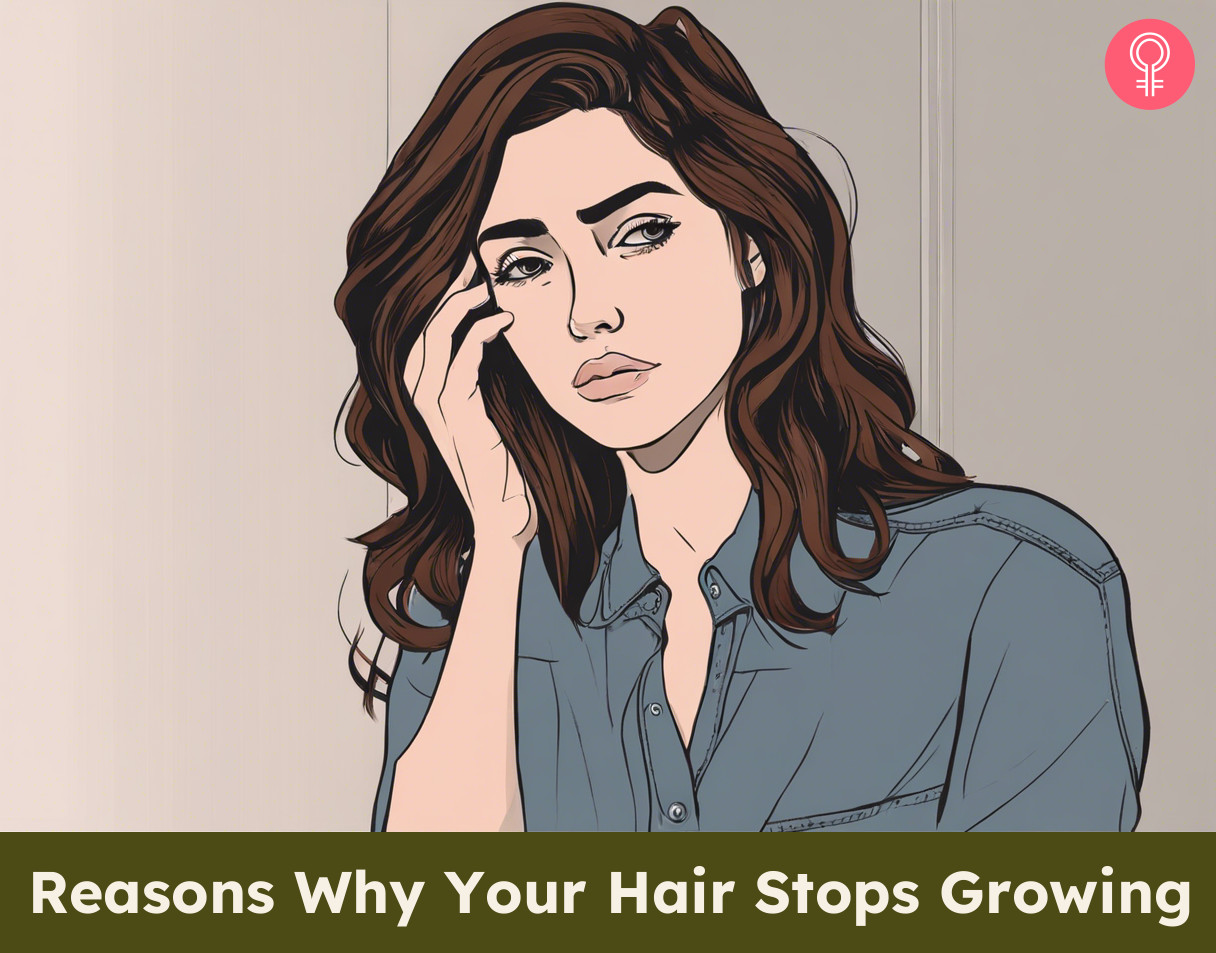
Image: Stable Diffusion/StyleCraze Design Team
Curious about hair growth? Discover the reasons why your hair may stop growing and learn if hair growth truly halts. Find out the truth in this informative video. Don’t miss it!
Personal Experience: Source
StyleCraze's articles are interwoven with authentic personal narratives that provide depth and resonance to our content. Below are the sources of the personal accounts referenced in this article.
i. Why is My Hair Not Growing??! Solutions to Your Stagnant Length Problems Part 1https://glamlushhair.blogspot.com/2014/09/why-is-my-hair-not-growing-solutions-to.html
References
Articles on StyleCraze are backed by verified information from peer-reviewed and academic research papers, reputed organizations, research institutions, and medical associations to ensure accuracy and relevance. Read our editorial policy to learn more.
- Advances In Understanding Hair Growth, f1000 Research, US National Library Of Medicine, National Institutes of Health.
https://www.ncbi.nlm.nih.gov/pmc/articles/PMC4755418/ - The Genetics Of human hair Growth, Birth Defects Original Article Series, US National Library Of Medicine, National Institutes of Health.
https://www.ncbi.nlm.nih.gov/pubmed/5173315 - Stress And Hair Growth Cycle: Cortisol-Induced Hair Growth Disruption, Journal of Drugs in Dermatology.
https://jddonline.com/articles/dermatology/S1545961616P1001X - Burden Of Hair Loss: Stress And The Underestimated Psychological Impact Of Telogen Effluvium And Androgenetic Alopecia, Journal Of Investigative Dermatology.
https://www.jidonline.org/article/S0022-202X(15)30963-5/fulltext - A Comment On The Science Of Hair Aging, International Journal Of Trichology, US National Library Of Medicine, National Institutes of Health.
https://www.ncbi.nlm.nih.gov/pmc/articles/PMC6369639/ - What Ages Hair, International Journal Of Women’s Dermatology, US National Library Of Medicine, National Institutes of Health.
https://www.ncbi.nlm.nih.gov/pmc/articles/PMC5419032/ - Alopecia Areata, Nature Reviews, Disease Primers. US National Library Of Medicine, National Institutes of Health.
https://www.ncbi.nlm.nih.gov/pmc/articles/PMC5573125/ - Diet And Hair Loss: Effects of Nutrient Deficiency And Supplement Use, Dermatology Practical And Conceptual, US National Library Of Medicine, National Institutes of Health.
https://www.ncbi.nlm.nih.gov/pmc/articles/PMC5315033/ - Thyroid Hormone Signaling Controls Hair Follicle Stem Cell Function, Molecular Biology Of The Cell, US National Library Of Medicine, National Institutes of Health.
https://www.ncbi.nlm.nih.gov/pmc/articles/PMC4454174/ - The Changes In The Hair Cycle During Gestation And The Post Partum Period, Journal Of The European Academy Of Dermatology And Venereology, Us National Library Of Medicine, National Institutes of Health.
https://www.ncbi.nlm.nih.gov/pubmed/23682615 - Hormonal Effects on Hair Follicles, International Journal of Molecular Sciences, Us National Library Of Medicine, National Institutes of Health. https://www.ncbi.nlm.nih.gov/pmc/articles/PMC7432488/
- Hair Growth in Disorders of Metabolism, Hair Research, Springer Link.
https://link.springer.com/chapter/10.1007/978-3-642-81650-5_38





